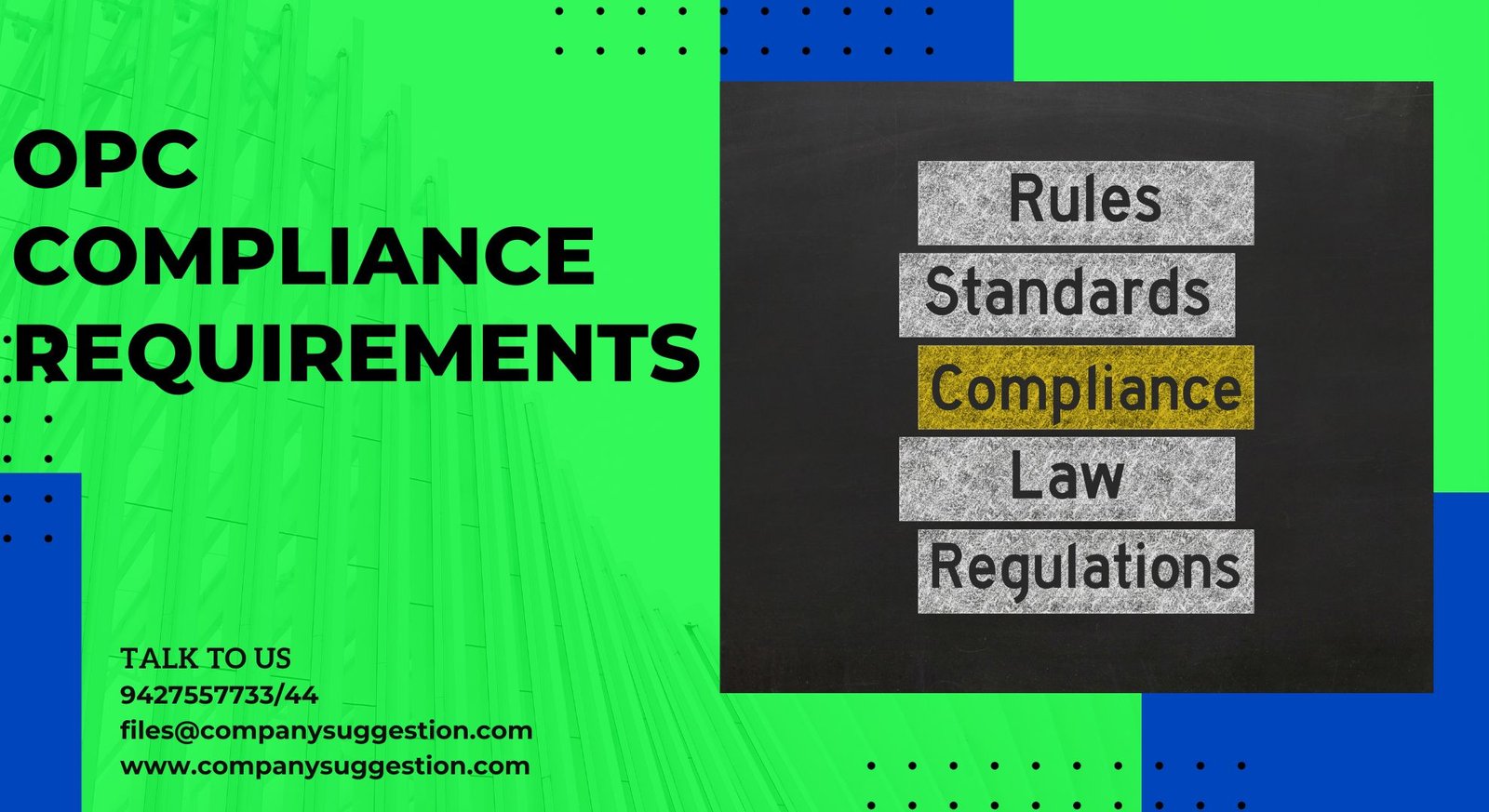OPC COMPLIANCE REQUIREMENTS
A One Person Company (OPC) is a legal business structure that allows a single individual to establish a company and run it as the sole owner and director. OPCs offer limited liability protection to the owner, meaning personal assets are safeguarded in case of business debts or losses. This format combines the flexibility of a sole proprietorship with the legal advantages of a private limited company, making it an attractive option for solo entrepreneurs and small business owners.
GENERAL COMPLIANCE REQUIREMENTS
An OPC (One Person Company) in India is a type of company that can be formed with only one person as its member. It’s a popular form of business structure for solo entrepreneurs. OPCs are governed by the Companies Act, 2013 in India. Here are the compliance requirements for an OPC in India:
- Appointment of a Nominee: The sole member of an OPC needs to appoint a nominee while registering the OPC. In case the sole member is incapacitated or dies, the nominee takes over the management of the OPC.
- Director Identification Number (DIN) and Digital Signature Certificate (DSC): The sole member must obtain a DIN and a DSC for filing documents electronically with the Ministry of Corporate Affairs (MCA).
- Registered Office: The OPC must have a registered office within 30 days of incorporation. Any change in the office’s address must be intimated to the Registrar of Companies (RoC) within 15 days.
- Annual Filings: OPCs are required to file their financial statements and annual returns with the RoC. This includes the balance sheet, profit and loss account, and other documents. The filing due dates need to be adhered to.
- Tax Compliance: The OPC must comply with the tax regulations, including filing income tax returns and paying taxes on time. Goods and Services Tax (GST) registration might be applicable based on turnover.
- Statutory Audit: An OPC is required to get its accounts audited annually. However, a One Person Company is exempt from audit if its turnover does not exceed the prescribed limit, which is INR 2 crores as per the latest threshold in 2021.
- Board Meetings: Since there is only one director, formal board meetings might not be applicable. However, all decisions need to be recorded in writing.
- Compliance with ROC: The OPC needs to comply with all the regulations and guidelines provided by the Registrar of Companies (RoC). This includes timely filings, maintaining statutory registers, and updating necessary information with the RoC.
Annual Compliances for OPC
The compliance requirements and due dates for One Person Companies (OPCs) in India were governed by the Companies Act, 2013, and the rules made thereunder. Here are the annual compliance forms for a One Person Company along with their due dates:
- AOC-4 (Form for filing financial statements):
- Due Date: Within 180 days from the end of the financial year.
- Purpose: This form is used for filing financial statements, including balance sheet, profit and loss account, and other documents with the Registrar of Companies (ROC).
- MGT-7 (Form for filing Annual Return):
- Due Date: Within 60 days from the conclusion of the Annual General Meeting (AGM).
- Purpose: This form contains details about the company’s shareholders, directors, meetings, etc. It provides a snapshot of the company’s general details for a particular financial year.
- ADT-1 (Form for Appointment of Auditor):
- Due Date: Within 15 days from the conclusion of the AGM.
- Purpose: This form is used to intimate the RoC about the appointment of an auditor for the company.
- DIR-3 KYC
- Any Director who have DIN and he is filing KYC detail first time with MCA, shall file KYC detail through e-form DIR-3.
- Any director who has submitted KYC details in previous financial year or who has not require to update any KYC information, in this case DIN holder is require to perform annual of KYC by assessing e-form DIR-3 KYC WEB.
Advantages of Annual Compliance in One Person Company:
Annual compliance in a One Person Company (OPC) is crucial for maintaining legal and financial integrity. Here are some advantages of ensuring annual compliance in an OPC:
- Legal Compliance: Annual compliance ensures that the OPC complies with all the legal requirements specified by the government. This helps in avoiding legal troubles and penalties that might arise due to non-compliance.
- Credibility: Compliant OPCs are viewed as more credible and trustworthy by clients, investors, and partners. It enhances the company’s reputation and can attract more business opportunities.
- Tax Compliance: Annual compliance involves filing tax returns and paying taxes on time. This prevents any issues with tax authorities and ensures that the company’s finances are in order.
- Limited Liability: OPCs provide limited liability to the owner, separating personal assets from business liabilities. Compliance helps in maintaining this limited liability status, protecting the owner’s personal assets in case of business losses or debts.
- Access to Funding: Compliant OPCs are more likely to attract investors and secure funding from banks or financial institutions. Investors feel more secure investing in a company that adheres to regulatory norms.
- Business Expansion: Compliant OPCs are better positioned for expansion and growth. They can enter into contracts, acquire assets, and expand their operations without legal hurdles.
- Avoiding Penalties: Timely compliance helps in avoiding penalties and fines levied by regulatory authorities for non-compliance. These penalties can be substantial and can impact the financial health of the company.
- Employee Trust: Compliance with labor laws and regulations ensures that employees’ rights are protected. This fosters trust and loyalty among the workforce, leading to a positive work environment.
- Operational Efficiency: Compliance procedures often involve regular audits and reviews of the company’s operations. This can lead to improved operational efficiency and better management practices.
- Statutory Records: Maintaining proper records as part of compliance ensures transparency and accountability in the company’s financial transactions and decision-making processes.
Documents required for the Annual Compliance of One Person Company
The annual compliance requirements for a One Person Company (OPC) in India include several documents and filings that need to be submitted with the Ministry of Corporate Affairs (MCA) to ensure legal and regulatory compliance.
Typically, the documents required for the annual compliance of a One Person Company include:
- Financial Statements: OPCs are required to prepare financial statements such as the Balance Sheet, Profit and Loss Account, and Cash Flow Statement.
- Board Report: The OPC is required to prepare a report by its Board of Directors containing details specified in the Companies Act.
- Annual Return (Form MGT-7): OPCs are required to file their annual return with the Registrar of Companies (RoC). Form MGT-7 contains details about the company’s share capital, indebtedness, and other important matters related to the company.
- Income Tax Returns: OPCs need to file income tax returns with the Income Tax Department. This includes filing of ITR-6 (for companies other than those claiming exemption under section 11) or ITR-7 (for companies claiming exemption under section 11).
- Tax Audit Report (if applicable): If the turnover of the OPC exceeds the prescribed limit, tax audit under the Income Tax Act may be applicable. In such cases, a tax audit report, audited by a chartered accountant, needs to be submitted along with the tax return.
- Compliance Certificate (Form AOC-4): OPCs are required to file a compliance certificate in Form AOC-4, which certifies that the company has complied with all the provisions of the Companies Act.
- Other Documents: Depending on the specific activities and nature of the business, there might be other documents or compliance requirements applicable to the OPC.
Company Suggestion provides services of Compliances services along with same Income Tax Returns, GST Registration or Returns etc.
Our experts of team will guide you related to compliances of Companies, Firms and other entities if you have any doubt regarding this, then you can send your doubts on company suggestion and clear it.













